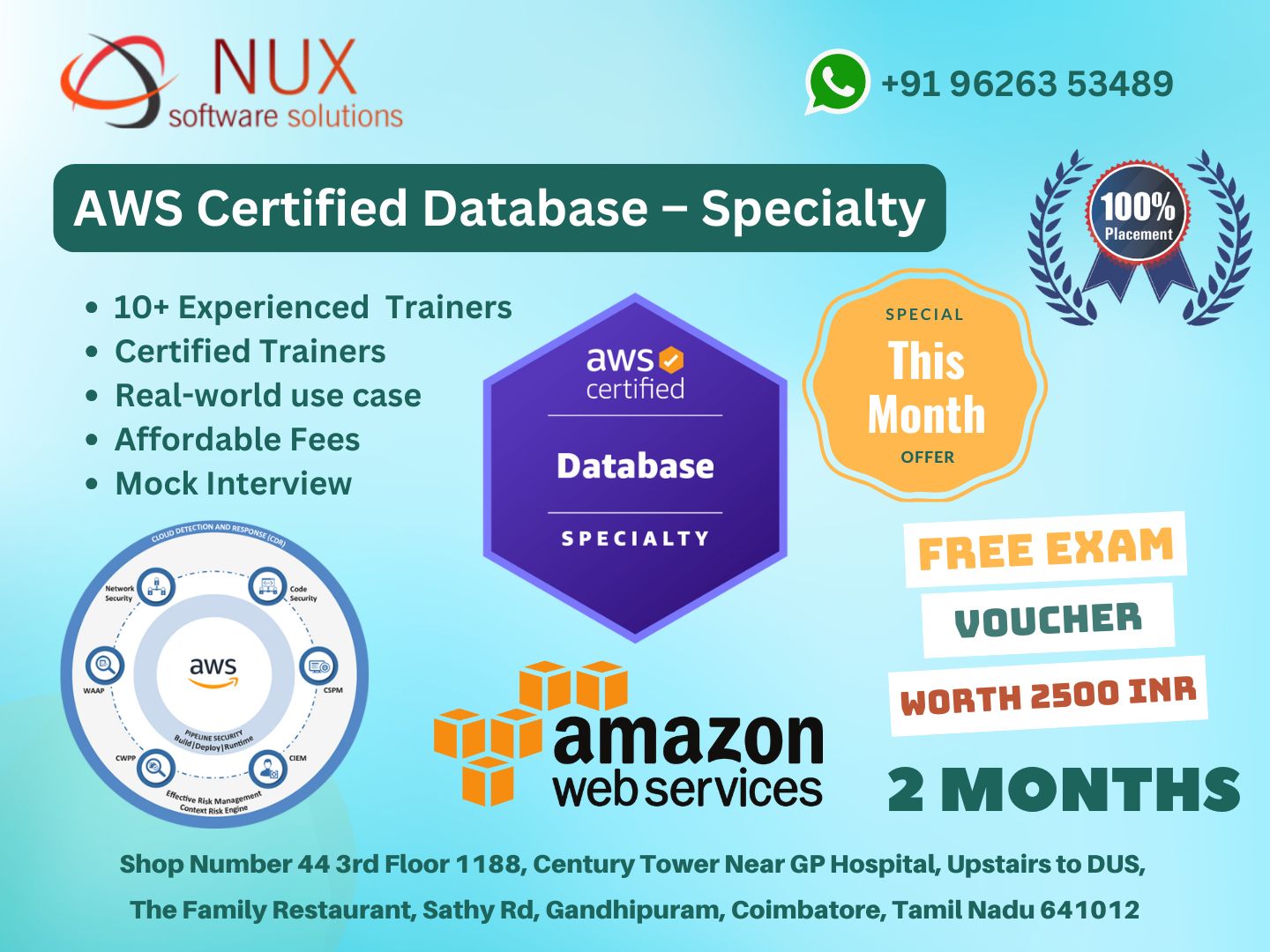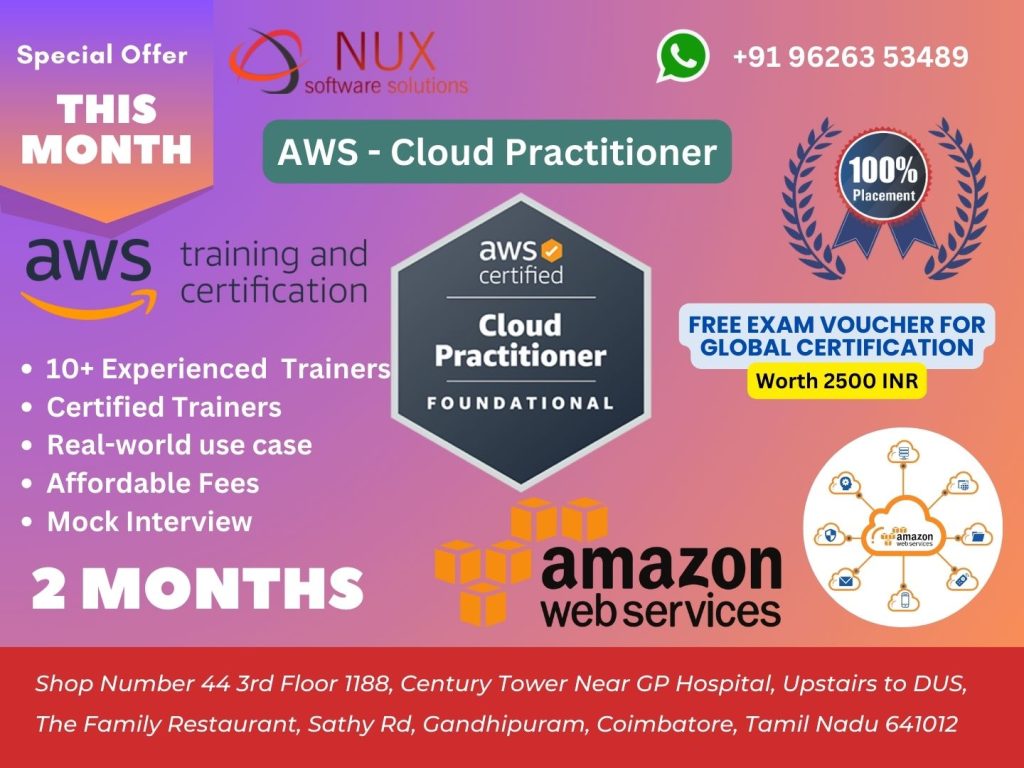AWS Certified Database – Specialty

Best AWS Certified Database – Specialty Training Courses in Coimbatore
Nux Software Solutions in Coimbatore is the top choice for thorough preparation for the Database – Specialty exam. As a top AWS training provider, our focus is on giving you the necessary skills and knowledge to succeed in the ever-changing realm of cloud computing.
AWS: Advancing Your Business Expansion
AWS is a cloud platform that is secure, dependable, and scalable, enabling businesses to innovate and succeed. Utilizing AWS services such as computing power, content delivery, and database storage allows for streamlined operations, cost reduction, and growth acceleration.
The Program we offer for AWS Training
Our AWS training program at Nux Software Solutions is created to give you a comprehensive knowledge of AWS architectural principles, services, and best practices. Our skilled teachers will lead you in practical activities and practical situations, guaranteeing that you are ready to make the most of the revolutionary power of cloud computing.
Main advantages of participating in our AWS training program
Thorough Syllabus: Our classes encompass all the necessary subjects for test, such as AWS services, structure, and optimal development methods. Skilled Teachers: Our instructors are knowledgeable experts in AWS with a strong desire to educate. Hands-On Labs: Acquire real-world expertise with AWS services using our modern lab spaces. Various learning options are available such as in-person, virtual, and company-provided training to suit different time commitments. Take advantage of our extensive industry connections for help with finding a job through our career placement assistance services.
What makes Nux Software Solutions stand out?
Expertise in the industry: Our success in training AWS professionals is well-documented. Dedication to Excellence: We are committed to delivering top-quality training and support services. Reasonable prices: Our competitive pricing enables individuals to easily access AWS training. Are you prepared to begin your AWS adventure?
Sign up for our training course for AWS Certified Database – Specialty today.
AWS Certified Database – Specialty Syllabus
Workload-Specific Database Design - 26%
Select appropriate database services for specific types of data and workloads.
- Differentiate between ACID and BASE workloads.
- Explain appropriate uses of types of databases (e.g., relational, key-value, document, in-memory, graph, time series, ledger).
- Identify use cases for persisted data compared with ephemeral data.
Determine strategies for disaster recovery and high availability.
- Select Region and Availability Zone placement to optimize database performance.
- Determine implications of Regions and Availability Zones on disaster recovery and high availability strategies.
- Differentiate use cases for read replicas and Multi-AZ deployments.
Design database solutions for performance, compliance, and scalability.
- Recommend serverless compared with instance-based database architecture.
- Evaluate requirements for scaling read replicas.
- Define database caching solutions.
- Evaluate the implications of partitioning, sharding, and indexing.
- Determine appropriate instance types and storage options.
- Determine auto scaling capabilities for relational and NoSQL databases.
- Determine the implications of Amazon DynamoDB adaptive capacity.
- Determine data locality based on compliance requirements.
Compare the costs of database solutions.
- Determine cost implications of DynamoDB capacity units, including on-demand capacity compared with provisioned capacity.
- Determine costs associated with instance types and automatic scaling.
- Design for costs, including high availability, backups, multi-Region, Multi-AZ, and storage type options.
- Compare data access costs.
Deployment and Migration - 20%
Automate database solution deployments.
- Evaluate application requirements to determine components to deploy.
- Choose appropriate deployment tools and services (e.g., AWS CloudFormation, AWS CLI).
Determine data preparation and migration strategies.
- Determine the data migration method (e.g., snapshots, replication, restore).
- Evaluate database migration tools and services (e.g., AWS Database Migration Service [AWS DMS], native database tools).
- Prepare data sources and targets.
- Determine schema conversion methods (e.g., AWS Schema Conversion Tool [AWS SCT]).
- Determine heterogeneous compared with homogeneous migration strategies.
Perform and validate data migration.
- Design and script data migration.
- Run data extraction and migration scripts.
- Verify the successful load of data.
Management and Operations - 18%
Determine maintenance tasks and processes.
- Account for the AWS shared responsibility model for database services.
- Determine appropriate maintenance window strategies.
- Differentiate between major and minor engine upgrades.
Determine backup and restore strategies.
- Identify the need for automatic and manual backups and snapshots.
- Differentiate backup and restore strategies (e.g., full backup, point-in-time, encrypting backups cross-Region).
- Define retention policies.
- Correlate the backup and restore to recovery point objective (RPO) and recovery time objective (RTO) requirements.
Manage the operational environment of a database solution.
- Orchestrate the refresh of lower environments.
- Implement configuration changes (e.g., in Amazon RDS option groups and parameter groups, or DynamoDB indexing changes).
- Automate operational tasks.
- Take action based on AWS Trusted Advisor reports.
Monitoring and Troubleshooting - 18%
Determine monitoring and alerting strategies.
- Evaluate monitoring tools (e.g., Amazon CloudWatch, Amazon RDS Performance Insights, database native).
- Determine appropriate parameters and thresholds for alert conditions.
- Use tools to notify users when thresholds are breached (e.g., Amazon Simple Notification Service [Amazon SNS], Amazon Simple Queue Service [Amazon SQS], CloudWatch dashboards).
Troubleshoot and resolve common database issues.
- Identify, evaluate, and respond to categories of failures (e.g., troubleshoot connectivity; instance, storage, and partitioning issues).
- Automate responses when possible.
Optimize database performance.
- Troubleshoot database performance issues.
- Identify appropriate AWS tools and services for database optimization.
- Evaluate the configuration, schema design, queries, and infrastructure to improve performance.
Database Security - 18%
Encrypt data at rest and in transit.
- Encrypt data in relational and NoSQL databases.
- Apply SSL connectivity to databases.
- Implement key management (e.g., AWS Key Management Service [AWS KMS], AWS CloudHSM).
Evaluate auditing solutions.
- Determine auditing strategies for structural and schema changes (e.g., DDL).
- Determine auditing strategies for data changes (e.g., DML).
- Determine auditing strategies for data access (e.g., queries).
- Determine auditing strategies for infrastructure changes (e.g., AWS CloudTrail).
- Enable the export of database logs to Amazon CloudWatch Logs.
Determine access control and authentication mechanisms.
- Recommend authentication controls for users and roles (e.g., IAM, native credentials, Active Directory).
- Recommend authorization controls for users (e.g., policies).
Recognize potential security vulnerabilities within database solutions.
- Determine security group rules and Network ACLs for database access.
- Identify relevant VPC configurations (e.g., VPC endpoints, public subnets compared with private subnets, perimeter zone).
- Determine appropriate storage methods for sensitive data.

